In the entertainment industry, there’s one thing on everyone’s minds, from the entry-level executives to the CEOs whose annual salaries exceed $20 million:
Artificial intelligence (AI)
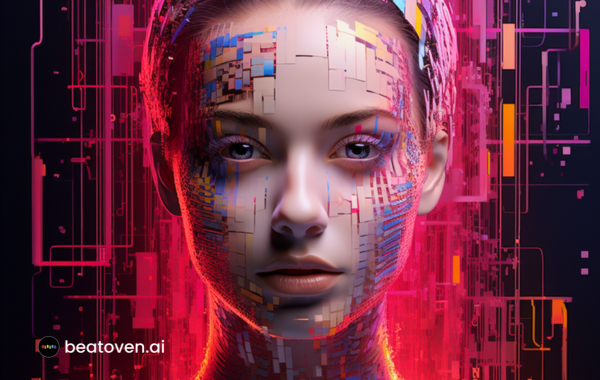
Publishing houses are using it to render new book covers. Movie studios are using it to create opening credit sequences for streaming shows. Not to mention how they’re scanning background actors’ bodies and then, with the help of AI, reproducing their likeness in other projects – all without the actors’ permission.
Music is no less a beneficiary of AI than any other entertainment sector. AI can be found everywhere in music – from low-brow TikTok edits that have Donald J. Trump singing “Summertime Sadness” by Lana del Rey to high-profile use cases like cleaning up an old recording of The Beatles and releasing it as the band’s “final song.”
This burgeoning interest in and usage of AI in the music industry prompts reasonable questions about how artists can receive fair compensation. After all, their voices and music now appear in places they never permitted. They should be paid for their contribution to the work.
However, the sheer scope of this topic dictates that we can’t just talk about compensation. We must also discuss how and if AI will change how we monetize digital music content. What are the ripple effects? How will it impact not just the creators and the studios but also the listeners and fans and how they enjoy music?
To have a hope of answering those questions, we must start by understanding the role that AI has to play in music creation and production.
AI and Music Production
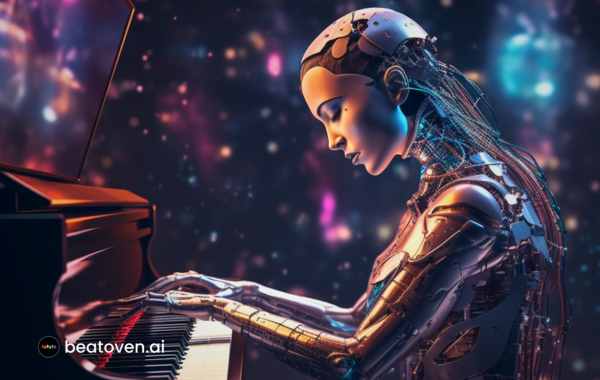
Google “AI music production,” and you’ll come across dozens or hundreds of websites listing the best AI tools to generate, enhance, and augment your music.
The ability of AI to produce or edit music is astonishing in its range. Sometimes, you can use it to break an existing track down into its component parts, called stems, to isolate the ones that sound the best. This way, you can salvage an otherwise terrible recording or combine different stems into a new creation.
In other cases, you can generate an entirely new song from scratch without songwriting or recording.
AI-Generated Music: A New Frontier
It seems impossible or like some kind of magic. But when you break it down, AI-generated music is just about data.
For AI to generate a new, original song, it must first have plenty of data to work from. That data consists of music in massive volumes. From there, AI can create music composition algorithms based on detectable patterns. Then, all a human has to do is tell it what kind of a song they want it to create, and it will produce a unique-sounding track.
This sounds good, but it’s also a significant controversy in the music industry. If an AI receives songs from a particular artist without their permission and then uses them to create algorithms to generate new tracks, that infringes the artist’s rights as the original creator.
The AI-generated track could end up sounding similar to a pre-existing song. Such a state could challenge its purported “originality” and open the producer to copyright or plagiarism claims.
However, there is an upside to the generative power of AI in music: the opportunity to use it as a collaborative tool to further original creation. For example, artists and producers can use AI to ideate and brainstorm future compositions.
AI’s collaborative potential extends beyond the music production itself, all the way to the other end of the creative-to-consumer funnel: the listeners.
AI’s Influence on Music Discovery and Recommendation Systems
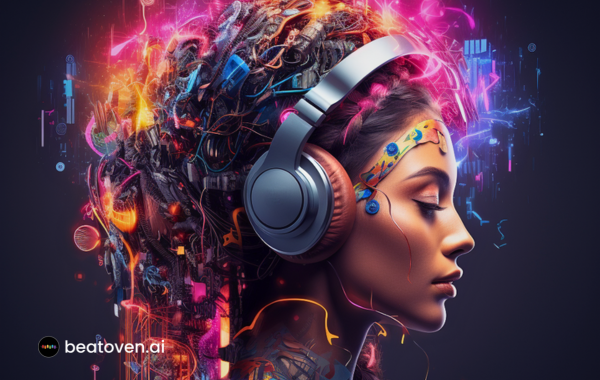
Machine learning is an aspect of AI whereby the AI learns how to perform an action based on the input it receives. That input is typically data, which, as mentioned earlier, can include music.
But when we apply AI to music streaming services like Spotify, Apple Music, or YouTube Music, it’s not just tracks used to develop a predictive algorithm. It’s the actions of the humans listening to them.
When you use a service like Spotify, the platform’s built-in AI monitors which genres, artists, albums, and songs you listen to and how often to build a music recommendation algorithm. This is why, when you log into your account and scroll down the homepage, you see recommendations under headings like “New releases for you” and “Your favorite artists.”
Of course, AI-driven music recommendations have their limitations in usefulness. You may, for example, listen to a Taylor Swift song one time and suddenly receive suggestions for songs by Lana del Rey, Harry Styles, and Ed Sheeran. On a daily basis, however, you prefer listening to heavy metal bands. This is where human curation will always be superior.
AI and Copyright: Challenges and Opportunities
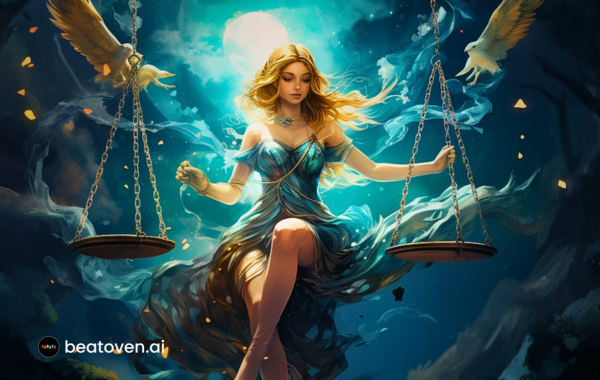
As we alluded to earlier, the use of AI to generate music is fraught with concerns over how it infringes on copyright. It’s a complicated topic, particularly in light of the fact that it’s not clear who actually owns AI-generated music. Does it belong to the developers of the AI tool, the person using it, or the artists whose music was scraped to feed the tool?
No one knows for sure, which means that any disputes over these matters must be fought before the law gets resolved.
Indeed, that’s precisely what has been happening. Getty Images, for example, is suing a company called Stability AI for copying millions of their photos for their generative image tool.
On the music side, in early 2023, a TikTok user employed an AI that they “trained” with songs by The Weeknd and Drake to generate a totally new track with those artists’ voices. It went viral before anyone knew what was happening or that the song was fake. It was only pulled from streaming platforms when the artists’ record label, Universal Music Group, filed copyright claims against it.
However, according to legal experts at Harvard Law, the creator of the fake song could fight back against the copyright claim by claiming fair use: a legal doctrine whereby creators can sample copyrighted materials for education, satire, criticism, and other limited purposes.
The Changing Landscape of Royalties and Revenue Streams
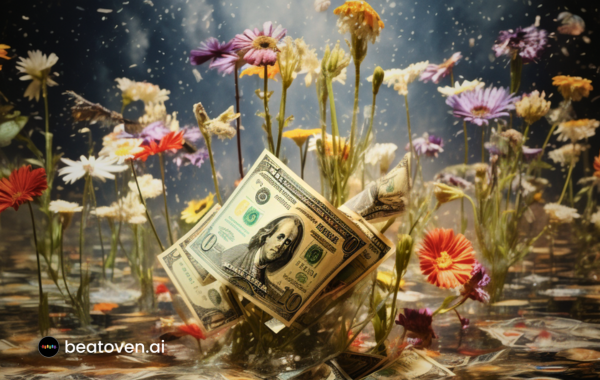
If the creator of the AI single were to invoke fair use and be successful, then Drake and The Weeknd would not be compensated for the track – even though their voices are on it.
That’s a huge concern because artists receive very few royalties from streaming: typically a few cents or tenths of a cent per stream.
This is merely a snapshot of a bigger picture: the changing landscape of royalties and revenue streams and how musicians can be fairly compensated for their work when it’s fed into, reproduced, and regurgitated by AI.
If artists’ voices and musical styles can be reproduced and streamed on music platforms without the artists themselves receiving any compensation, this would cause significant disruption to traditional revenue models.
It would also open up new opportunities for artists to receive yet more compensation – providing they were willing to sell their songs and/or voices for AI training.
The Role of AI in Enhancing Fan Engagement and Marketing
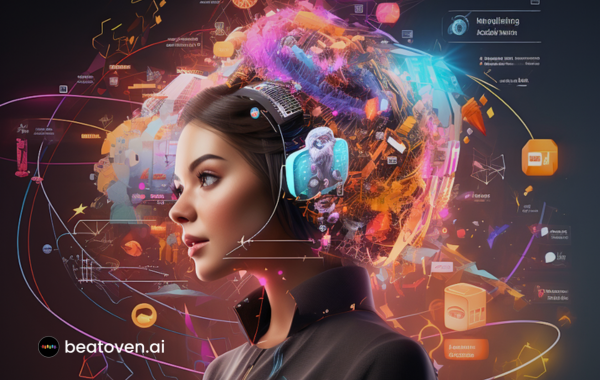
So, is there no place for AI in music at all without running into ethical or legal ramifications? One might argue that it has a place in an area we haven’t covered yet: fan engagement and marketing.
The use of AI in marketing is an old story. One can understand why, knowing how AI works: give it reams of data about your target audience to recognize patterns and develop algorithms. Then use it to generate targeted marketing materials and strategies and even predict consumer behavior in a fraction of the time it would take a team of human beings to yield the same results.
AI helps musicians in another way, too. After learning about its target audience, it can promote music on social media to people who, based on all the known metrics (e.g., demographics, listening history, etc.), would enjoy it the most. In this way, it’s more effective and efficient at engaging fans to listen.
AI, Programmatic Advertising, and Monetizing Music Engagement
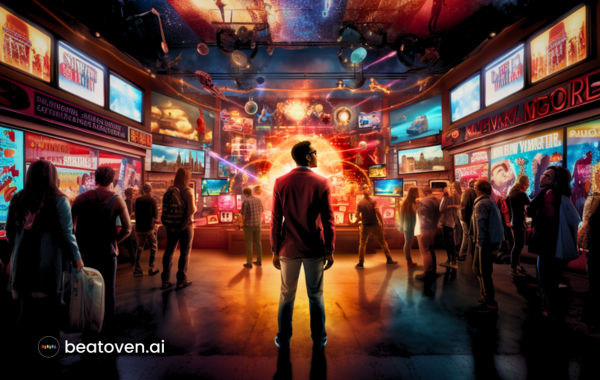
With AI transforming how artists connect with their fans and promote music, it’s no surprise that the advertising sector is also tapping into the power of AI to enhance monetization avenues. Enter programmatic advertising.
Programmatic advertising utilizes AI to automate the buying and selling of ad space in real time. This is particularly relevant for music streaming platforms with a wealth of user data.
Programmatic advertising can serve highly targeted ads that resonate with specific user profiles by understanding a listener’s habits, song preferences, and listening durations. For instance, a user who listens to many upbeat workout playlists might be shown ads for athletic wear or gym memberships.
Not only does this benefit advertisers by providing more precise targeting, but it also offers an opportunity for artists and record labels. They can promote their content, merchandise, or concert tickets to the most engaged and relevant listeners.
However, while the precision of programmatic advertising promises higher engagement rates, it’s crucial to handle user data responsibly. Transparency and consent are paramount, especially in an era where data privacy and ethical AI practices are under the spotlight.
Hyper Personalized Fan Experiences
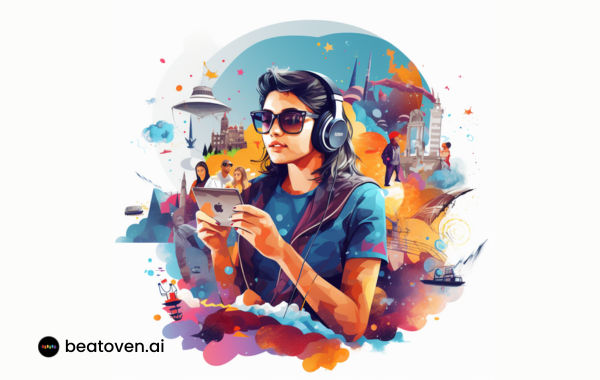
The advantage of engaging music fans with AI is that it opens the door for hyper-personalised fan experiences that establish a strong relationship between the artist and the consumer.
For example, musicians can use AI-powered chatbots and virtual assistants to communicate with fans, answer frequently asked questions, and automate merchandise purchases. They can also use fan analytics and AI to create advertisements and marketing campaigns specifically targeting different types of fans. And, of course, the music recommendation algorithms on streaming platforms are also a form of hyper-personalised fan targeting.
But as with all things related to this uncharted territory that is AI, there’s a potential drawback. To input so much data about your target audience, you must first collect it
Since the dawn of the internet, there have been mounting concerns from private citizens and government entities about how companies collect consumers’ personal data online. Some websites are open about how they gather people’s information and what they do with it. But others aren’t. This presents a major ethical conundrum, and it will only become more of a hot-button issue as AI permeates every known industry.
Conclusion
For the reasons above, it’s more important than ever for artists, record labels, and streaming platforms to reevaluate and develop practical, legal frameworks for their relationships with AI-generated musical content. This is their only recourse if they want to survive the future of AI in music while receiving fair compensation and not having their work stolen.
Listeners, too, should be aware of how AI works and learns from their data and how consuming AI-generated content and using AI music production tools could impact the extent to which they enjoy music from their favorite creators in the months and years to come.
Frequently Asked Questions
How does AI affect the creativity of musicians?
AI can enhance the creativity of musicians by giving them space to brainstorm, ideate, and explore new avenues in music that would otherwise be closed to them. Here’s a vivid example.
Will AI replace human musicians in the future?
AI can never fully replace human musicians. Since AI relies on the input of pre-existing music to output new songs, this model would quickly become unsustainable without creating new, original music by human creators.
What are the potential legal implications of AI-generated music?
Based on the case where the US Copyright Office denied copyright to a graphic novelist for using AI to generate illustrations for her book, it may be safe to assume that the ability to use an AI-generative tool to create and profit from music will be throttled at the copyright phase, at least in the United States. However, a standard practice for addressing these situations has yet to be established.
But you don’t need to worry about any of this if you’re using Beatoven. For example, a YouTube content creator recently used a Beatoven-generated track as background music for a travel vlog.
Since the music is free of copyright claims, the video was monetized without any issues, and the content creator didn’t have to navigate through the complicated terrain of copyright laws or worry about potential takedowns or strikes.
Beatoven provides a hassle-free solution to integrating music into your creative projects, eliminating concerns around legal implications.
Author BIO:

Alise Zaiceva
Alise Zaiceva is a content marketing manager at a website monetization platform Setupad. She’s passionate about content and helping publishers scale their businesses through powerful digital marketing strategies. In her free time, she travels to explore bookshops and eat local cuisine and also does yoga.
